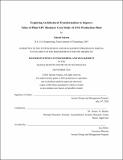Exploring architectural transformation to improve value of plant EPC business : case study of LNG production plant
Author(s)
Fukatsu, Takeshi, S.M. Massachusetts Institute of Technology.
Download1262990756-MIT.pdf (4.145Mb)
Other Contributors
Massachusetts Institute of Technology. Engineering and Management Program.
System Design and Management Program.
Advisor
Donna H. Rhodes.
Terms of use
Metadata
Show full item recordAbstract
Plant EPC projects, typically for LNG production plants, are the most expensive types of facilities in the world. While many of them have been built in the last several decades, the EPC cost did not decrease, and rather a significant cost increase in the last decade was observed. The most significant reasons are that the requirements became more complex, associated structure and piping facilities became more complex and heavier, more design change occurred during the EPC, supply-chains became more dominant and higher priced, workforce inflation occurred. Cost overrun and schedule delay of plant EPC business is quite common; however, it causes heavy pain for many associated enterprises. While many lessons have accumulated in organizations and many experienced brilliant engineers and project managers are doing their best to eliminate cost overruns and schedule delays, not many projects can successfully manage their completion within budget on schedule. This makes the LNG price higher. On the other hand, societal pressure has become high to decrease LNG price. While the world's LNG demand is expected to increase, many of the off-takers cannot make economic sense above the LNG price of $6/mmBtu because high pressure to reduce carbon emission renders their infrastructures more complex and expensive. LNG is a prospective energy source that can reduce world carbon emission substituting for coal and oil that emit twice as much greenhouse gas as LNG does per unit energy. To reduce global warming, EPC contractors of LNG plants could play a significant role. This thesis explores the current problems faced by their EPC business, and seeks to make EPC more valuable and lower cost by transforming the enterprise architecture of EPC contractors.
Description
Thesis: S.M. in Engineering and Management, Massachusetts Institute of Technology, System Design and Management Program, September, 2020 Cataloged from the official version of thesis. Includes bibliographical references (pages 134-142).
Date issued
2020Department
Massachusetts Institute of Technology. Engineering and Management ProgramPublisher
Massachusetts Institute of Technology
Keywords
Engineering and Management Program., System Design and Management Program.